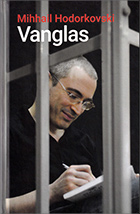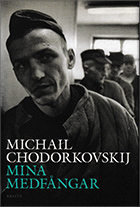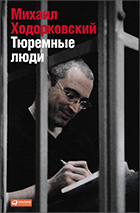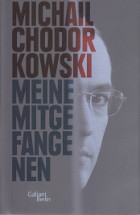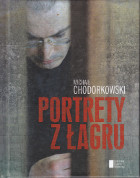Mikhail Khodorkovsky
My Fellow Prisoners
Proposal
Rights acquired by
-
- Galiani/Kiepenheuer & Witsch, Germany
- Penguin, UK/US
- Alpina, Moscow
- Sammakko, Finland
- Agora, Warsaw
- Ersatz, Stockholm
- Glagoslav, Amsterdam
- Edicije Bozicevic, Croatia
- Ajakirjade Kirjastus, Estonia
The most famous prisoner in Russia, Mikhail Khodorkovsky, had been released from labour-camp just before Christmas 2013. He immediately announced that he will fight for the release of the many political prisoners who are still incarcerated in Russian prisons and labour-camp.
The columns Khodorkovsky has written in prison about his fellow prisoners and which appeared in The New Times, Moscow, in Frankfurter Allgemeine Sonntagszeitung, and in The New York Times, have been published as a book that will accompany his campaign to free Russian prisoners.
“After so long in prison I certainly have no illusions about the people I have come across. Nonetheless, many prisoners have their principles. Are they valid ones from society’s point of view? Some are, some aren’t. But they are principles, all the same, for which people are prepared to suffer. Really suffer,” says Khodorkovsky.
Some of the prisoners are jailed for minor reasons, others are murderers, one is a convicted “paedophile” (who at 18 lived together with his girlfriend who was not yet of legal age in her parents’ house), another is already for five years in labour-camp because he was caught smoking pot. Khodorkovsky treats them all without prejudices, learns a lot from their life stories and how they bear their fates. And he never talks about his own fate.
There is the guard who delivers blows with no visible traces. The fraudster stitched up by the police for murder. The man who refuses to lie for a packet of cigarettes. The abandoned teenager, the down-and-out, the grass… He describes a hidden world of brutality and corruption, yet one where moments of humanity still manage to shine through.
One in ten Russian men pass through prison at some point in their lives. This book is a denunciation of an entire system of bureaucratic criminality, and a passionate call to recognise a human tragedy.
“Slight as they are, the sketches in this new book are vivid, humane and poignant” Financial Times
“The book is not a piece of self-justification. It is not a complaint against a system in which justice serves as the long arm of politics. It is more than this: it is a declaration of love for human beings; it is a journal of purification; it is a self-accusation; it is – quite unexpectedly – great literature.“ Welt am Sonntag
“In his prison stories, Khodorkovsky dissects an entire society. If an unknown prisoner had written this work, it would not have been less readable. For it raises questions that go far beyond Russia: ‘How do we define what is good, and what do we feel ashamed about all our lives? When does conscience triumph over fear, and fear over conscience?’” Der Spiegel
From the foreword by Mikhail Khodorkovsky:
“Many times in prison, and later in the camp, then in prison again and in the camp again I felt the desire to listen to classical music, live. Somehow that had not happened before, somehow life had been insanely turbulent. Also, I was eager to read something in quite a different environment and discuss it – at that time a piece of paper was often my only conversation partner. Today I have no desire whatsoever to talk about my life ‘back then’ in prison. But the persistent editor asked me for a foreword to the book that was written in circumstances so different from the ones in which I find myself now.
It is no easy task. For when I once more read what I had written during the more than ten years of my imprisonment, over and over again I unwillingly live through the life which I once believed would be the same forever. On the 25th of October 2003, on the day of my arrest, I couldn’t guess that the details, as banal and mundane as they were, would ever interest anyone later. Have you survived? That’s good then. Additionally, as a technocratic person through and through, and anything but an aesthete, I used to regard reading as a kind of compulsory exercise, which provided access to necessary information, or made you think. And still today, with my hand on my heart, I can admit quite openly to myself: What sort of writer am I, really?! (…)
I even find it strange to be typing words on the computer now, to have given up the habit of making notes on little pieces of paper from time to time.
People often asked me, and continue to ask, how often in a day, a week, a month and a year I had the opportunity to use the Internet, a computer, or modern means of communication. The answer is: in more than ten years I didn’t have this opportunity at all! Some modern leaders of the opposition were surprised by how well-informed I was in the course of our correspondence, without even being able to imagine that I did not have a computer or Internet access in my cell. At any rate, they were only surprised until they came under arrest for ten days or so themselves – that was quite enough for them to understand…
The book that you are now holding is an attempt to provide a look into a world to which most normal people usually have no access; a backward world, comfortable for some, uncomfortable for others, which exists in my country side by side with the present, as if there were no technical progress, no achievements of civilization. But everyone in Russia who has read Solzhenitsyn and Shalamov, and also everyone who has never even heard of these great writers, has imbibed with their mother’s milk the wisdom that is deeply rooted in every Russian’s subconscious: ‘No one is immune to poverty and prison’.
Exercising the inner discipline that my parents had taught me as a child, and without thinking about a release in the near future, I plunged myself into mental work, conducted extensive correspondence and long-distance disputes, and wrote prison stories about what I saw myself, about what I experienced and what could happen to anyone. About the country where our wonderful people live in lawlessness and poverty, but also about the Russia which we will be able to feel proud of without a sense of shame, and which will ultimately take the path of European civilization. Our common path.
